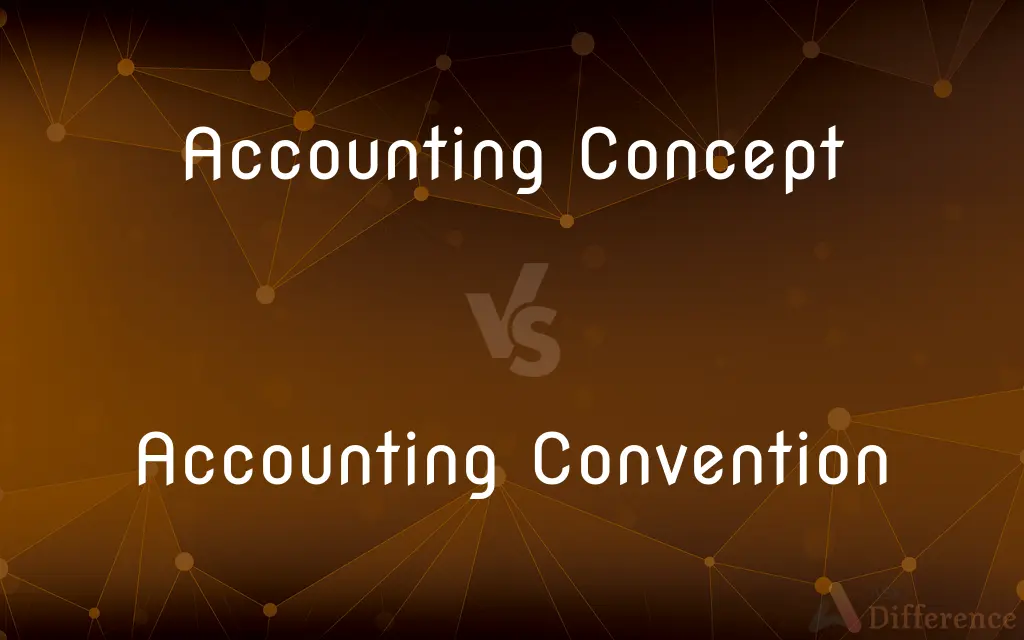Accounting Concept vs. Accounting Convention — What's the Difference?
By Tayyaba Rehman & Urooj Arif — Published on July 26, 2024
Accounting concepts are foundational ideas, while conventions are accepted practices for financial reporting.

Difference Between Accounting Concept and Accounting Convention
Table of Contents
ADVERTISEMENT
Key Differences
Accounting concepts are the basic principles that form the foundation of accounting theory and practice. They guide the preparation and presentation of financial statements, ensuring consistency, reliability, and comparability. Accounting conventions, on the other hand, are the customs or practices that have become accepted over time by the accounting community. These conventions provide additional guidance on how to apply accounting principles in practical situations.
While accounting concepts lay the groundwork for accounting practices, conventions deal with the nuances of applying these practices in the real world. Concepts are more about the 'why' behind accounting practices, whereas conventions focus on the 'how' to implement those practices effectively.
The relationship between accounting concepts and conventions is complementary. Concepts provide a theoretical framework, while conventions adapt these theories into practical applications. This balance ensures that financial reporting is both principled and adaptable to the evolving business environment.
Adherence to both accounting concepts and conventions is crucial for the credibility of financial reporting. It ensures that financial statements are not only prepared in accordance with theoretical principles but are also practical, understandable, and useful to stakeholders.
Accounting concepts are relatively stable, while conventions may evolve over time as business practices and the economic environment change. This evolution allows the accounting profession to respond to new challenges and ensure that financial reporting remains relevant.
ADVERTISEMENT
Comparison Chart
Definition
Fundamental principles that guide accounting practices
Accepted practices that have become standard in financial reporting
Purpose
Provide a theoretical framework for financial reporting
Adapt theoretical concepts into practical applications
Examples
Going Concern, Accrual Concept
Conservatism, Materiality
Focus
Underlying principles of accounting
Practical application and adaptation of principles
Evolution
Relatively stable, changes with significant theoretical advancements
Evolves with changes in business practices and economic environment
Compare with Definitions
Accounting Concept
Provides comparability across financial statements.
Matching Concept ensures expenses are matched with the revenues they generate, aiding in the comparability of financial statements.
Accounting Convention
Facilitates practical application of concepts.
Full Disclosure Convention requires that all relevant financial information is disclosed in financial statements.
Accounting Concept
Fundamental principle guiding financial reporting.
The Going Concern Concept assumes the business will continue operating in the foreseeable future.
Accounting Convention
Adapts to changing business environments.
The Consistency Convention allows for changes in accounting methods, provided they are disclosed and justified.
Accounting Concept
Basis for accounting theory and practice.
Accrual Concept requires expenses and revenues to be recorded when they are incurred, not when cash changes hands.
Accounting Convention
Customary application of accounting principles.
Materiality Convention allows insignificant deviations for practicality's sake.
Accounting Concept
Ensures consistency and reliability.
The Consistency Concept mandates that once an accounting method is adopted, it should be used consistently throughout.
Accounting Convention
Accepted accounting practice evolved over time.
The Conservatism Convention advises caution, recognizing expenses and liabilities as soon as possible.
Accounting Concept
Guides the preparation of financial statements.
Historical Cost Concept dictates that assets are recorded at their original purchase cost.
Accounting Convention
Ensures financial statements are useful to users.
Objectivity Convention ensures that financial statements are based on objective evidence.
Common Curiosities
Can you give an example of an accounting concept?
The Accrual Concept is an accounting principle that income and expenses are recognized when they occur, not necessarily when cash is received or paid.
How do accounting conventions evolve?
Conventions evolve with changes in business practices, economic environments, and regulatory landscapes to ensure financial reporting remains relevant and practical.
What is an example of an accounting convention?
The Conservatism Convention is a practice where accountants prepare financial statements by exercising caution, recognizing expenses and losses as soon as possible.
Why are accounting concepts important?
They provide a theoretical framework that ensures the consistency, reliability, and comparability of financial statements.
Can accounting conventions change over time?
Yes, accounting conventions can change as they adapt to new business practices, technologies, and economic conditions.
What role do accounting standards play in concepts and conventions?
Accounting standards formalize the application of accounting concepts and conventions, ensuring uniformity and comparability across financial statements.
Why is the Full Disclosure Convention important?
It ensures that all relevant financial information is presented, aiding stakeholders in making informed decisions.
How do accounting concepts and conventions affect financial reporting?
Together, they ensure that financial statements are prepared on a consistent and practical basis, enhancing their usefulness to stakeholders.
How does the Accrual Concept affect the reporting of income and expenses?
It requires that income and expenses be recorded when they are earned or incurred, regardless of when cash transactions occur.
What is the difference between an accounting concept and convention?
Accounting concepts are fundamental principles, while conventions are accepted practices derived from these principles.
Is the Materiality Convention an accounting concept or convention?
The Materiality Convention is an accounting convention that allows minor items to be disregarded if their omission or misstatement could not influence the decision-making process of users.
Do all countries follow the same accounting concepts and conventions?
While the fundamental accounting concepts are widely accepted, specific conventions may vary by country due to differences in regulatory and business environments.
How does the Going Concern Concept influence financial statements?
It assumes that the business will continue its operations in the foreseeable future, affecting asset valuation and depreciation methods.
What is the purpose of the Consistency Convention?
It ensures that once an accounting method is chosen, it is used consistently across reporting periods to allow for comparability.
Can a business ignore an accounting convention?
Ignoring an accounting convention can lead to misleading financial statements and is generally not advisable unless justified and disclosed.
Share Your Discovery

Previous Comparison
C3 Plants vs. C4 Plants
Next Comparison
Iced Coffee vs. Iced LatteAuthor Spotlight
Written by
Tayyaba RehmanTayyaba Rehman is a distinguished writer, currently serving as a primary contributor to askdifference.com. As a researcher in semantics and etymology, Tayyaba's passion for the complexity of languages and their distinctions has found a perfect home on the platform. Tayyaba delves into the intricacies of language, distinguishing between commonly confused words and phrases, thereby providing clarity for readers worldwide.
Co-written by
Urooj ArifUrooj is a skilled content writer at Ask Difference, known for her exceptional ability to simplify complex topics into engaging and informative content. With a passion for research and a flair for clear, concise writing, she consistently delivers articles that resonate with our diverse audience.













































